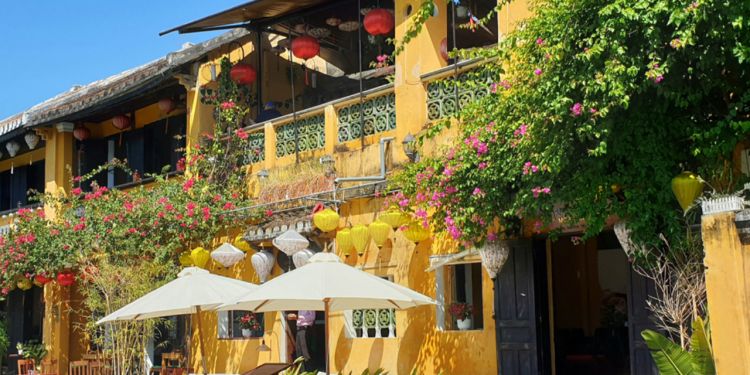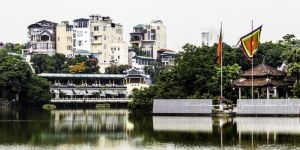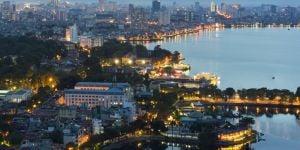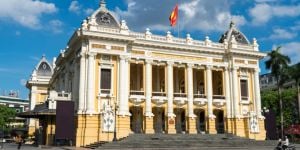
With Vietnam a rising star on the international stage, the capital city of Hanoi is experiencing a plethora of exciting and innovative projects in the pipeline. Vietnam's capital city's middle class has been rapidly growing over the past few years, and the housing market is steadily accelerating. Transportation upgrades, including a metro line, green buses, and a focus on green fuel, Hanoi should never be underestimated.
Important:
Buying property in Hanoi is simple enough, but all documents must be completed in Vietnamese. We have, therefore, included reliable translation services at the bottom of this article.
Where to buy property in Hanoi
Hanoi is full of charms and challenges, and it simply depends on the area you choose to live in. First and foremost, foreigners cannot buy land in Hanoi, as this is owned by the people and regulated by the state. One of the most notable areas of the capital city is Tây Hồ, a popular location for new and old foreigners to settle down.
Housing prices in this part of town are typically at their highest compared with other districts of Hanoi. Cầu Giấy is another attractive district and is home of Keangnam Hanoi Landmark Tower, Hanoi's tallest building. Cầu Giấy is also home to the Korean community that has chosen to settle in Hanoi. Walking the streets of Do Quang, Nguyen Thi Thap, Hoang Ngan, or Hoang Dao Thuy will give you a firsthand look at their community and culture.
The process of buying property in Hanoi
As Vietnam is a developing country, foreigners are often charged slightly more. It is important to remember that this practice will occasionally transcend into the housing business, and you may feel frustrated when sharing your contract with Vietnamese friends.
Cushman & Wakefield highlights that Hanoi saw a surge in new apartment supply, with 28,700 units launched in 2024. The average primary price increased to USD 2,917/m². The landed property market also grew, with prices reaching USD 11,934/m².
Vietnam's housing law seems simple upon inspection, as it states that anyone with a Vietnam visa in their passport can potentially buy property. The realities, of course, are a little more technical.
We've compiled a broad overview of prices to purchase property in Hanoi below:
- If you are looking to purchase an apartment in popular local areas like Cau Giay and Thanh Xuan, prices range from VND 45–60 million/m² ($1,750–2,334/m²).
- If you are looking to purchase a house in a core neighborhood of the city (for example, Dong Da or Hoan Kiem), prices start from VND 150 million/m² (5,835/m²).
Setting up a 100% foreign-owned business
The most common way of buying property is setting up a business in Vietnam that is 100% foreign-owned. This process should take a month or two if no additional licenses are needed. You will need to contact the Department of Planning and Investment (DPI) to get your Investment Registration License, which will allow you to start a business in Hanoi and typically lasts up to ten years. From here, a Business Registration Certificate will be required, giving you a further 90 days to make the initial investment.
Forming a joint venture
Going into business with a Vietnamese shareholder will allow you to purchase households and real estate projects, as well as buildings for sale. While Vietnamese citizens can lease property indefinitely, local companies may lease until the termination of the company. One of the most common mistakes foreign investors make is using unreliable nominees, so it pays to thoroughly research trusted partners first. Emerhub has an outstanding reputation throughout Vietnam and other Southeast Asian countries.
Buying as an individual
Foreigners who are residents are legally allowed to buy property in Hanoi; however, it is under the condition that it is for personal dwelling only. Properties owned by individuals cannot be rented to third parties and are subject to a lease term of 50 years. These leases are renewable. If you are married to a Vietnamese citizen or are an overseas Vietnamese, you are granted freehold tenure on any property you own.
Finalizing a property purchase in Vietnam
After choosing a property of interest, the first step will be to sign a reservation agreement, linking the seller and you. This will typically involve paying a deposit. Due diligence must be paid here, and it is strongly recommended that you notarize the reservation agreement to protect your interests legally.
Ensure the seller is legitimate by requesting to see their identification and property ownership certificates. Details of their insurance or a bank guarantee will also reinforce their integrity and trustworthiness. Property purchase agreements must be drafted in Vietnamese but legally finalized in English and Vietnamese.
Here is a broad overview of fees you should be prepared to cover when buying a property in Hanoi:
- Registration fee: This will be 0.5% of the property's registered value or government-assessed value (whichever is higher).
- Notary: This fee may be split between the two parties involved (purchaser and seller) but should range from VND 50,000 to 1,000,000,000 (USD $1.95-$38,000). The scale is large, as the final price depends on the transaction value. A notary will handle legal compliance, remain a neutral witness for documentation, and assist with fraud prevention.
- Pink book legal name change: The pink book is the ownership/deed papers of the property. It is a flat fee of VND 500,000 - 1,000,000 (USD 19.45 - 38.90), depending on the ward and district of the property.
- Bank fees: Depending on the bank you are using for the purchase, you should prepare for appraisal and loan processing fees, combined with buying insurance through the financial institution.
- VAT (Value Added Tax): This will be 10% of the sale price and falls on the responsibility of the seller. It can also be used as leverage during negotiations.
Useful contacts:
Recommended Hanoi Translation
(877) 708-0005
info@chang-castillo.com
AM Vietnam Translation Company
sales@amvietnam.com
Tel:+842438789800
We do our best to provide accurate and up to date information. However, if you have noticed any inaccuracies in this article, please let us know in the comments section below.












Comments